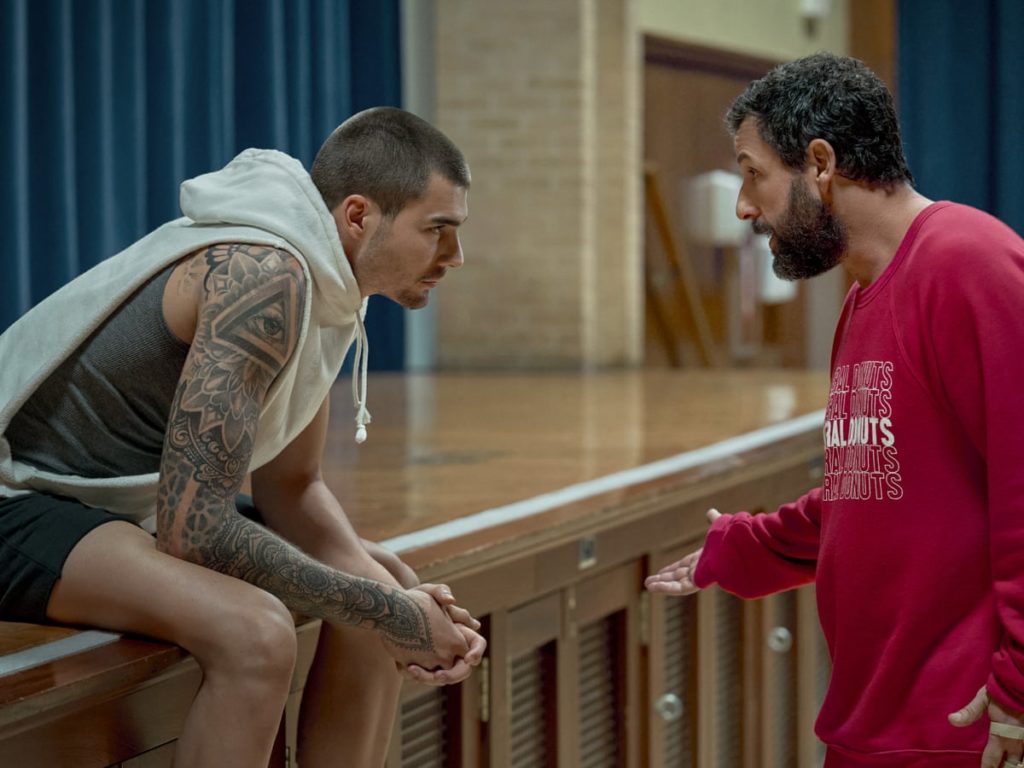
Sports movies are some of the hardest movies to make work because they’re so inherently cliched. You got some sports person, either an athlete or a coach or a GM, who’s an underdog in some sense, and then they fight to get to the top where they finally win the big game and HOORAY, we’re all happy.
In theory.
But in reality, whenever you see a sports movie on the docket, you feel like you’ve already seen it before. That was my issue with Hustle. I watched the trailer and I thought, “Okay, I definitely don’t have to see that movie.” Because it looked exactly like every other sports movie.
But I noticed a few of you talking about it in the comments and I thought, okay, I’ll give it a chance, fully expecting to tap out within 15 minutes.
But 15 minutes turned into 30, 30 to 60, and 60 until I reached the credits. The movie kept my attention the whole way through.
This made me stop, as it always does, and evaluate what happened to make me become so invested in this story. Cause I’m bored by most movies. Screenplays only have a handful of directions they can go. So it’s not hard to predict where they’re going.
“Hustle” was no exception. It went down the route I mostly knew it would go down. Yet I rooted for the characters. Yet I cared. Yet I was wondering how things would get resolved.

I can’t emphasize, enough, how important it is to answer this question. Because we are all working with a template that has been used, re-used, chewed up, spit out, regurgitated, reborn, used again, and used some more with every one of our screenplays. We are always fighting the battle of telling a story that’s already been told.
So if you can understand how a small percentage of these stories end up being good, you don’t have to reinvent the wheel every time you come up with a concept. You know that you can take a generic template and make it exciting.
Which is what Hustle did.
But how did it do it?
The answer is obvious yet complicated. What you first must accept is that there isn’t anything you can do plot wise that audiences haven’t seen before. Once every few years, somebody comes up with some whopper of a plot twist (Bruce Willis is a ghost!) that we didn’t see coming. But it’s hard to come up with truly shocking plot developments consistently.
I caught The Man From Toronto this weekend, which was a reasonably fun movie. But that movie literally hits every single Screenwriting 101 story beat that the screenwriting teachers say you have to hit. As a result, I will not remember any of it by the end of the month.
Luckily, there’s a way to overcome this issue.
You do it with your characters.
And the nice thing about this solution, is you really only have to do it with your hero.
If you can make us root for your hero, we will like your screenplay regardless of what you do with the plot. I know that sounds like a controversial statement but it really isn’t. It’s no different than if you meet a new friend or girlfriend or boyfriend who you really like. Do you need to travel to New York and take trips to the top of the Empire State Building to be happy around that person? No. You could literally lay on the couch for 10 straight hours eating Oreos and that would be enough.
Same deal here. Audiences are less concerned with experiencing some amazing plot when they love the main character. For them, just being around him and seeing what he’s going to do next is enough.

Now does that mean you shouldn’t try to write the best plot possible? Of course not. You want to enhance the experience of hanging out with that character as much as possible. But what it does mean is that you don’t have to worry as much that the predictability of your plot is going to be a problem.
Whenever I’m helping a screenwriter or developing a script with a screenwriter and we’re deep in the weeds and we’re worried it’s not working, I always step back and remind myself, “As long as we get the characters right, we’ll be okay.”
Now what I do I mean when I say “root for?” Because that’s kind of vague. The way I see it is, if you can make us feel like your hero is a) a real person, b) a person who is fighting to better themselves, and c) place them amongst unfavorable circumstances that we would like them to get out of, that’s enough to get us to root for someone. As is the case with any screenwriting advice, this won’t work all the time. There are certain stories that need you to adjust the formula. But this covers the bulk of protagonists you’ll be writing in your screenplays.
Which brings us to Stanley Sugarman, Adam Sandler’s scout character in “Hustle,” who I believe is one of the most well-crafted characters in sports history in so much as making the audience want to root for him. So let’s go over how they achieve this within the “root for” triumvirate.
By the way, if you haven’t seen the movie, it’s about a lifetime NBA scout (Stanley Sugarman) who’s running out of time to fulfill his dream of becoming an Assistant Coach who finds a once-in-a-lifetime prospect in Spain who he wants his team, the Philadelphia 76ers, to pick in the draft. When the brash new jerky Sixers president tells Stanley he’s not interested, Stanley quits the team and brings the player to the United States on his own dime in the hopes of getting him into the draft.
First off, Stanley feels like a real person. Nobody TELLS us that Stanley is a great scout. They SHOW us. They show him grinding. In Germany, in Spain, in China. Watching games in the farthest reaches of the world, looking for that one diamond in the rough.
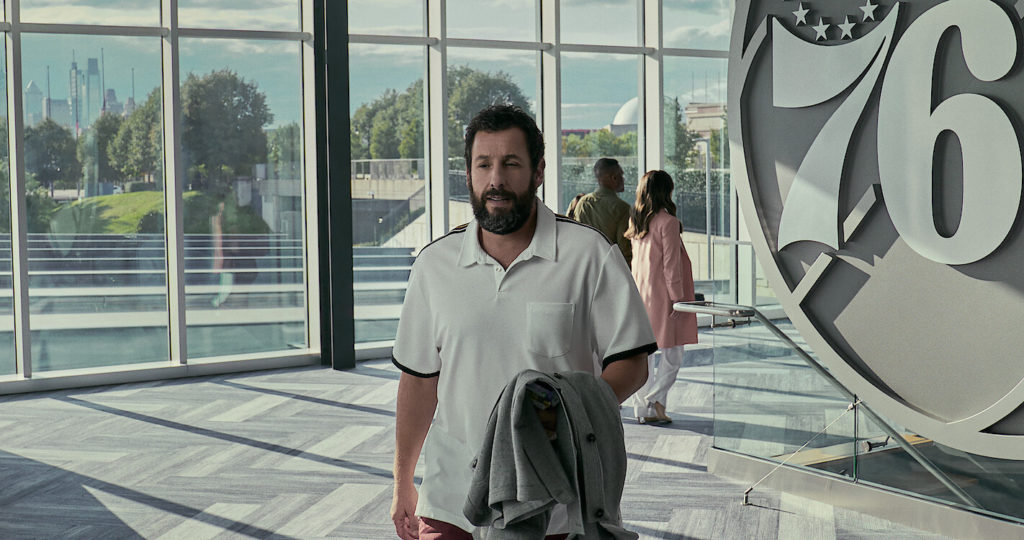
We show him in airports, in hotels, coming back to Philadelphia, then going back out on the road again. Its’s an endless fruitless job. They show us his family – his wife, his daughter. They show him intelligently breaking down the top players he scouted in board room meetings. They have him saying jargon that only a NBA scouts would know.
All of this convinces us that Stanley is a REAL PERSON. If you don’t convince us of that, the other two things don’t work. We have to buy into this guy being real. If you get lazy and don’t do the work like Hustle did to show us that he’s really in this world, we’re turning your movie off at the 15 minute mark.
Next we have a person who’s fighting to better themselves. This is a key component to making us like a character. Cause we can have issues with people. We had issues with Louis Bloom. We had major issues with Arthur Fleck. But was there anybody else in the nightcrawler game who wanted to be better than Louis? While Arthur Fleck’s clown co-workers were fine playing kid’s parties, Arthur was busy planning his ascension in the stand-up comedy world.
Audiences like people who are trying to better their lives. Stanley Sugarman is 50 and he’s been doing this scouting thing his whole life. And he’s tired. He has every reason not to try. But he does. He keeps going out there, keeps grinding, keeps trying to find that one diamond.
And finally you have the negative circumstances surrounding your protagonist. You create negative circumstances because it gives the character somewhere to ascend to. If they’re already near the top, we don’t need to root that hard for them because they already have a good life.
Stanley is 50 years old and he’s still sleeping in Chinese hotels 20 hours away from his wife and daughter five nights a week. Talk about negative circumstances. (Spoiler) Right when Stanley gets his first official office with the Philadelphia Sixers, the owner who gave him the job dies the next day. Leaving his jerk son who doesn’t like Stanley to run the team. Talk about negative circumstances.

That simple one-two combo of making your hero someone with a big goal and then repeatedly punching them down, away from that goal, is like a screenwriting magic trick when you do it well. Because we like this guy. And we feel sorry for this guy. So of course we’re going to root for him.
Just to be clear, none of this means that, once you’ve done these things, you should phone your plot in. Because you’re never entirely sure if what you’ve done with your workers works. We can follow the rules and still write average characters, unfortunately. So you might as well try to make the rest of your script great as well. But getting that protagonist right solves so many potential issues down the road.
If you are someone who struggles with creating characters that readers root for, watch this movie. Even just watching the first act is enough. Cause that’s where you spend the bulk of your efforts on making the reader fall in love with your hero.
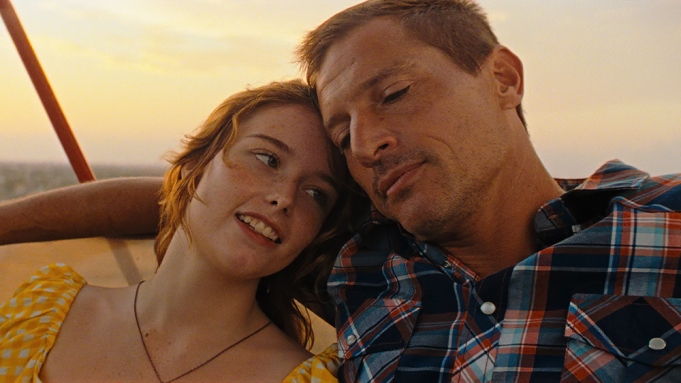 If you can write a character like Mikey, in “Red Rocket,” you’re in the discussion!
If you can write a character like Mikey, in “Red Rocket,” you’re in the discussion!
So, recently, a producer came to me saying he had a project he was trying to put together and needed a writer for it. This wasn’t some giant producer. But it was someone who could pay a writer real money. He hadn’t had a lot of success with literary agents, who he found pushed their weaker writers on him since he wasn’t A-List. Which is why he came to me. He knew I’d read more amateur screenwriters than probably anyone in town so, he figured, if there’s anyone who can find me a writer, it’d be Carson.
I get inquiries like this every couple of months and whenever I do, it helps me zone in on what it is that actually makes a good screenwriter. Because when you’re talking about screenwriters theoretically, there’s a leniency in your judgement. I want every screenwriter to succeed, especially the screenwriters on this site. So I see them through the lens of optimism and potential as opposed to reality.
But when someone’s paying money, all of that goes away. The last thing I want to do is refer a writer to someone, have that someone pay them a big check, only for the writer to deliver a weak script. Cause, of course, then I look bad.
So, all of a sudden, my eye becomes more astute. I’m able to see exactly what makes a screenwriter worthy of being a paid professional as I am literally recommending them to be paid. What is it I notice that prevents me from recommending someone and what is it I notice that leads to me endorsing them? That’s what I want to talk about today.
The first thing I notice is that the pool of writers I’d recommend to a producer is very small. We’re talking .5% of all the amateur writers I’ve read. Now before you freak out about that number, you have to understand that I’m not talking about recommending a writer to an agent here, of which the bar is more in the 3-5% range. I’m talking about actual money being transferred into the writer’s bank account. That’s a different conversation.
It’s the difference between potential and someone who’s got the goods. There are actually a handful of EXTREMELY TALENTED but raw screenwriters I know who I’d never recommend for this job because, to do this job, you have to understand the *craft* of screenwriting. You have to understand what the producer wants and have an actual game plan for putting it on the page.
These super-talented writers may have strong voices or a knack for great dialogue or a talent for taking stories to unexpected places. But many of those talents are connected to the freedom of constructing their own narrative. That approach doesn’t work as well when you’re adapting someone else’s idea.
To do that, you really need to understand structure. This is where the debate on whether there’s a “right” or a “wrong” way to write a screenplay leans towards “there is a right way.” Because the majority of Hollywood operates in the 3-Act Structure. Act 1, Act 2, Act 3. A beginning, a middle, an end. Setup, conflict, resolution. 25 pages, 50 pages, 25 pages. If you don’t understand that, it’s very hard to have a common language with your employer.
So that’s one of the first things I look for. I say to myself, “Do they understand the 3-Act Structure?” Cause if they don’t, it doesn’t matter what else the writer is good at, the script isn’t going to be paced well. It won’t have direction. It’ll feel like it’s wandering a lot. You got to have structure down, which, by the way, takes most writers about six scripts to feel comfortable with.
The next thing I think about is character. Specifically, have I read characters from this writer THAT I REMEMBER. Characters who jump off the page. Most screenplays – to be fair, even a lot of professional ones – give you characters who work for the story. But those characters don’t stick out. In other words, if you took the story away and just put that character in a bunch of random scenes, would they stick out? Would they be memorable?
For the majority of writers, the answer is no. They haven’t figured out how to do this yet. What do I mean by “memorable” character? Any character who feels larger than life via their charm, their pain, their eccentricities, their personality, their presence. Arthur Fleck, Louis Bloom, Cassandra in Promising Young Woman, Thor, Mad Max, Mikey in Red Rocket (guy in Ferris wheel at the top of this post), Mildred in Three Billboards. These are characters who rise above the page.
If you can pull these two things off, you are in the running. Cause these are the two most important things when it comes to nailing an assignment.
Dangling just below these two is dialogue. I’m not so much a “dialogue has to be great” guy as I am a “dialogue has to be good” guy. The reason for that is, great dialogue is rare. Name me three movies with great dialogue from last year. You probably can’t. Also, ironically, the better the dialogue is, the more subjective it becomes. That’s because flashier dialogue has more personality, and whenever personality is involved, some people hate that personality and some love it. Look no further than Juno’s dialogue as an example.
So I’m looking for dialogue that’s solid. There’s an honesty to it. There’s an effortlessness when it comes to covering exposition. The writer understands what dramatic irony is. They understand what subtext means. They also have the ability to add some extra flair to the dialogue to make it sound heightened, without it feeling try-hard.
If you can do those three things well – structure, character, dialogue – you are very much on my radar. I am now considering you for a paying job. Because now I know, at the very least, you are going to deliver a competent draft.
So, we’ve shrunk our pool of writers down to a small group. Who gets the job out of the remaining scribes?
Before I give you the general answer, I’ll give you the real-life one, which is that it depends on the project. If the project is dialogue heavy, I’ll go with the writer who writes the best dialogue. If it’s a comedy project, I’ll go with the funniest writer. If it’s a project that requires a certain weirdness, like The Lighthouse, then I’m recommending the writer with the most offbeat voice.
But if it’s a more generalized project, like, say, a biopic, I’m simply going with the best writer, or the writer I think has the most talent. Not only are they able to do all the things I listed above, but they also have that rare x-factor where they’re able to construct fictional stories in fresh and unexpected ways that make you feel things that you don’t feel when you’re reading everything else.
Another way to look at it is, somebody who’s the opposite of the average writer. The average screenwriter – someone who’s studied the craft and written more than six screenplays – does everything well, but nothing exceptionally.
If you want to become a paid screenwriter, you have to do at least one thing exceptionally. It can be that you write memorable characters, it can be that you write great dialogue, it can be that you’re so locked into the human condition that you can turn the average moviegoer into a slobbering pile of tears. But it’s gotta be something.
And part of the process of becoming a professional writer is identifying not necessarily what you *want* to be good at, but what you *are* good at, then writing scripts that allow you to showcase that talent. And then writing more of those scripts. And then writing more of them. Until you become an expert in that one specific area of writing. Because that means that when that type of project comes around, producers are going to think of you.
Finally, being the best at any aspect of writing is really hard. So there’s another option. Create your own future. After watching Tangerine this week (shot on an iPhone) and Cha Cha Real Smooth (made by a 22 year old), I’m reminded that sometimes it’s better to bring your own stuff to life than wait for someone else to anoint you. Because, do I think that Tangerine or Cha Cha Real Smooth would’ve lit the screenwriting world on fire? No, I don’t. Tangerine might’ve made The Black List. But Cha Cha Real Smooth wouldn’t have. So if those two were waiting for someone like me to say, “You’re the best of 10,000 writers,” they’d still be waiting. They went out and put those pages on the screen.
The point is, you have options. If nobody else believes in you, you can still succeed by believing in yourself. Whatever route you take, make sure to give it everything you’ve got. Cause I promise you, the competition is too stiff for any other approach.
Happy writing this weekend!
$100 OFF DEAL! – I’m giving $100 off two feature screenplay consultations this weekend. E-mail me at carsonreeves1@gmail.com with subject line: “100.” I give screenwriting consultations for every step of the process, whether it be loglines, e-mail queries, plot summaries, outlines, Zoom brainstorming sessions, first pages, first acts, pilots, features. If you’re wondering where your structure, or characters, or dialogue, stand, you can ask me to focus on them in your notes and I’ll be happy to assess them. E-mail me and let’s set something up!
Genre: Romantic Comedy
Premise: After Amanda is seemingly ghosted by the man of her dreams, she’s delighted to discover he’s actually been kidnapped — and takes it upon herself to be his rescuer, going on an adventure of epic proportions along the way.
About: This script finished with 9 votes on last year’s Black List. The writer has a small indie credit from 2014 but it’s safe to say that this is his true breakthrough in the business.
Writer: Dan Schoffer
Details: 104 pages
 Is Anna Kendrick the only actress who can make this character likable?
Is Anna Kendrick the only actress who can make this character likable?
In a recent newsletter I shared a comedy idea with you called “Friend-Zoned” about a beautiful woman notorious for friend-zoning all the men in her orbit, who then falls for a studly new guy at work, only to get friend-zoned for the first time in her life.
I thought it was a funny idea and I liked the potential internal journey of the main character. It’s fun to watch someone high and mighty get their comeuppance. The only thing I was worried about was, would anybody actually like someone who spends all of her interactions with men emotionlessly crushing their dreams?
This script proved to me that my worries were justified.
26 year old first year lawyer Amanda Tinsely has gone out on 87 Tinder dates this year alone. In every single instance, she has ghosted the guy after the first date. Amanda sees this as a good thing. If she were to actually call the guy and reject him, he would have to feel the sting of her disinterest. In all these cases, it’s easier if they just keep texting without a response and eventually figure it out on their own.
Then one day Amanda’s walking around and she hears a guy whistle at her. Morphing into Captain Marvel mode, she immediately scolds the man. That is until she realizes he was whistling to retrieve his dog, Paw McCartney. Feeling dumb and also realizing just how hot this guy (Julian) is, Amanda does a 180, goes home with him, and they bang.
Amanda is soooooo very happy that she’s finally found a guy that she likes, but the next day at work she realizes that he still hasn’t texted her. So she texts him. But he doesn’t text back. Not later that night. Not the next day. Not all week! Amanda is devastated because SHE’S JUST BEEN GHOSTED.
Of course, Amanda can’t leave it at that. Their connection is too strong! So she does what any rational person would do, finds out where Julian lives and goes to his house. As she’s about to ring the doorbell, the neighbor informs her that Julian has been missing all week. Amanda is ecstatic! This means Julian didn’t ghost her.
Amanda uses her law firm connections to get access to a private investigator, Dean, only to find out that Dean is one of the 87 guys she went on a date with and ghosted! Dean agrees to see her again basically to tell her that she’s a bad person, but reluctantly gets hired by Amanda to find Julian.
Dean eventually locates Julian in Panama, of all places, potentially kidnapped by a powerful business woman who is trying to take over the country’s internet. Dean and Amanda then fly down to Panama, find the compound where Julian is being kept, and try to infiltrate it via one of his body guards. Using the only talent she has – getting matched on Tinder – Amanda is able to match with the businesswoman’s bodyguard, giving the two a direct opening to rescue Julian! But what happens when Dean starts to actually like Amanda? Will he convince her to leave Julian there?
Ghosted highlights one of the trickiest aspects of writing comedies.
Comedies are meant to make people laugh.
Comedies also need a well-rounded interesting protagonist to make us care enough about the journey where we can bother to laugh. You can’t laugh if you’re barely paying attention.
Thus is the need to create a main character with a flaw. That flaw is what allows us to feel that they’re a real person with a REAL change that needs to happen in their life.
Unfortunately, by definition, a flaw is negative. And a lot of negative flaws result in unlikable characters.
The challenge with comedy scripts is to make the main character’s flaw deep enough that they feel like a real person who needs change, but not so deep that we dislike them.
I don’t think that Ghosted achieved that goal.
We just don’t like Amanda. She’s acting high and mighty on all her dates. She ghosts everyone. The guy she does fall for is some perfect model whose only positive attribute is his acrobatic sexual prowess.
Why are we supposed to root for this girl again?
I think what this writer is hoping for is the same thing I was hoping for in Friend-Zoned, which is that we’d all enjoy watching a pompous main character get their just desserts. We’d enjoy seeing them suffer at their own game – the same formula that was utilized successfully in Groundhog Day.
Groundhog Day is an interesting example because the main character was *really* unlikable. Like a bona fide a-hole. But the reason why that movie was able to overcome that was that it put its main character through hell. At a certain point things got so bleak that all Phil wanted to do was kill himself.
At that point, how could we not root for him? We felt terrible for the guy.
But “hate me first, love me later” is an untraditional structural choice that’s difficult to pull off, especially in this day and age where people make their minds up faster, and once they do, they mentally check out.
Either way, Ghosted never gives us any reason to change our minds about Amanda. She gets bumped and bruised a bit in Panama. But, for the most part, she has the same attitude of “I’m the prize and everybody else needs to realize that.” Nobody’s going to get behind a character like that.
With that said, there are things that work about the script. The dialogue is very light and fun. The dialogue I enjoyed most was when people would tell Amanda she was an idiot, such as this scene where she’s trying to explain to a cop her connection to Julian…

And there was one really fun set piece where Dean sent Amanda off on a Tinder date with Hector, the bodyguard, with the instructions to drug his drink with a concoction that would force him to tell the truth so they could get answers on where Julian was located. But what Amanda didn’t know was that the drug “strips” she’d be using could be ingested through the skin. So she’d taken them out of their baggie and placed them in her bra. Once on her skin, they dissolved, and so instead of Hector telling the truth, Amanda starts telling it.
But the script fails one final test which is that it doesn’t convincingly show its main characters falling in love. If we’re to root for Amanda and Dean to get together at the end, you have to give us 2-3 genuine scenes in the second act where we see them connecting. If you don’t have those scenes, then the big flashy ending where the girl runs after the guy to tell him she likes him feels empty. Because we never saw any chemistry there to back up those supposed feelings.
Romantic comedies can be deceptively hard because there are all these little things that you have to get right. But I think creating a likable protagonist and giving us convincing moments where we can see our main characters falling for each other are obvious prerequisites. Ghosted needed to nail those two things in order to avoid getting ghosted but didn’t.
[ ] What the hell did I just read?
[x] wasn’t for me
[ ] worth the read
[ ] impressive
[ ] genius
What I learned: The Hector Tinder Date Set Piece is a great example of what all of you should be doing with your set pieces. You come up with a plan – in this case, drug Hector so he tells them the truth – and then make something completely unexpected happen instead. Here, Amanda gets drugged instead. This ‘flipping of the plan’ turns this scene into something completely unexpected. You rarely want things going according to plan in screenplays. The majority of the time, you want the plan to fall apart.
What I learned 2: I’m seeing more and more comedy/romantic comedy scripts include exotic locations due to Hollywood wanting bigger flashier comedies that can play outside of the U.S. The adventure aspect of the script gives it a broader appeal than if everything was set in New York.
Genre: Sci-Fi
Premise: A mysterious terrorist takes over a top secret U.S. mountain military base that contains within it every ancient artifact that the U.S. has ever collected.
About: New Line just won the auction for this project. John Wick 4 helmer Chad Stahelski will direct it. The writers are Andrew Deutschman and Jason Pagan, who are on a tear right now. They just sold a horror project to Neal Moritz based on a series of TikTok videos, another horror project to Netflix, and a third horror project to eOne with one of my favorite directors, Andre Ovredal (Trollhunter), set to direct.
Writer: Andrew Deutschman and Jason Pagan
Details: 114 pages
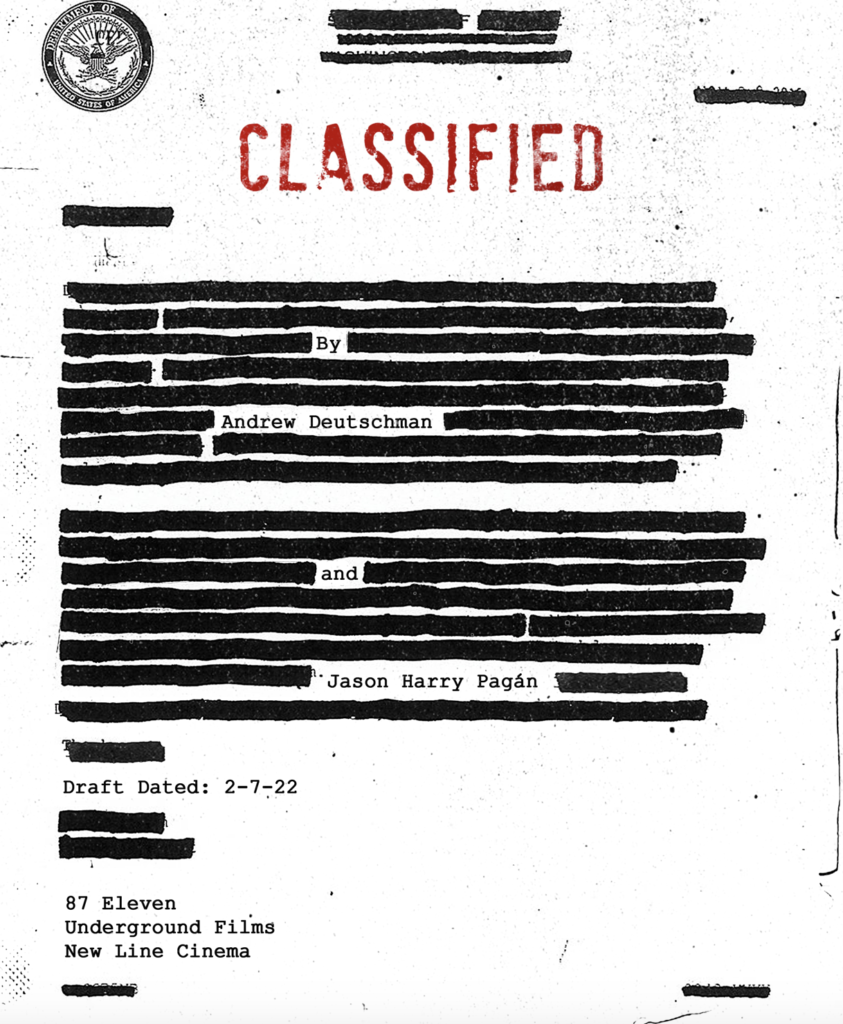
Today’s script makes me want to think of potential movie crossover pitches that would blow a studio executive out of the water.
The Matrix meets Shutter Island.
Star Wars meets The Joker.
Jurassic Park meets Deadpool.
Alien meets American Psycho.
Okay, fine. Those all suck. But today’s crossover does not suck. Die Hard meets Raiders of the Lost Ark?? Every 80s kid just got the visual material required for their next 30 wet dreams.
But here’s the funny thing with these monster crossover ideas: they can become a victim of their own amazingness. The reader is going in SO EXCITED that how can what’s delivered possibly live up to expectations?
We’ve had a few of those scripts come here only to plunge off a cliff. But I’m willing to bet that “Classified” will be different. Grab your whips, check your rear view mirror for stray boulders, and take a trip with me into this booby-trapped screenplay cave! And watch out for snakes!
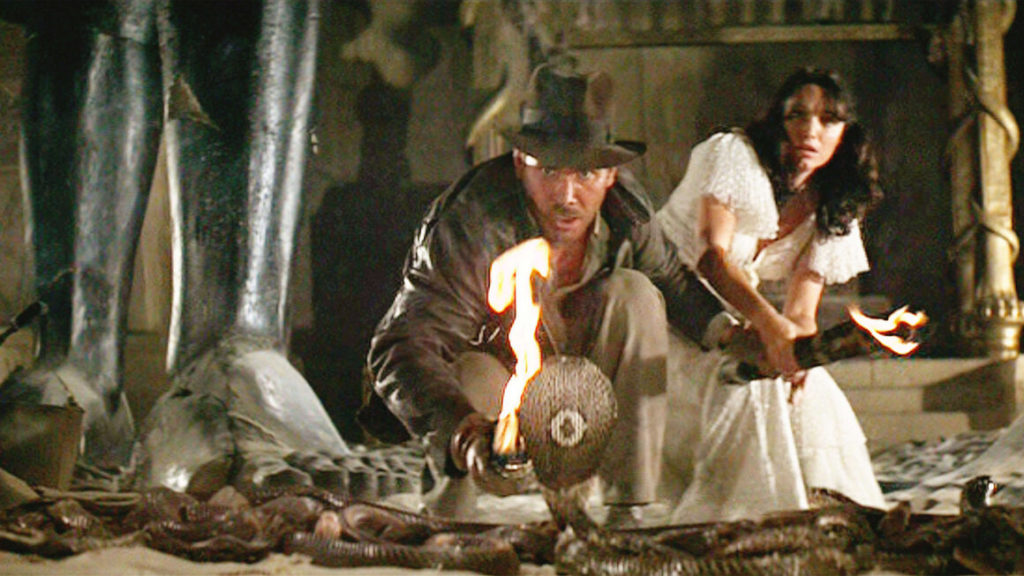
Cold open on the Cold War era, circa 1956. American Captain Carl Stoller escapes a laboratory right before a black sickness overtakes everyone inside. This disease came out of an ancient box scientists were studying.
Cut to present day and black market dealer Charlie finishes selling stolen ancient swords and vases for hundreds of thousands of dollars. As he’s packing up, Hamid Al-Ahtari arrives and tries to tell him a shield he claims belonged to Achilles. Yes, of heel fame. Charlie is incredulous but when a mysterious 90 year old man (Mr. X) backs Al-Ahtari up, Charlie gets the feeling the shield is the real deal.
But the second he buys it, the FBI charges in, led by Agent Jordan Gelman (a woman), and a kerfuffle follows. Charlie and Jordan end up on a Harley chasing Mr. X and Al-Ahtari in their truck, a truck that eventually crashes into a fuel tank, exploding! But somehow, there are no bodies inside the wreckage. Only the Achilles shield!
A couple of months later, Mr. X and Al-Ahtari break into a secret missile Silo base inside a mountain. That base happens to have a collection of Raiders of the Lost Ark like boxes in the back, things the U.S. military has collected over the past century. And guess what? They’re going to steal all of them.
It’ll be up to Jordan to lead a team in there (through a back tunnel connected via Camp David, the president’s vacation home) and stop Mr. X – who, by the way, sheds his old man skin revealing a 30 year old Carl Stoller! Jordan will need the help of the guy she hates most in the world, Charlie, to figure out what these guys plan to do with these artifacts!
Once the pair lead a team of agents into the mountain base, they realize what it is Stoller is looking for. PANDORA’S BOX. That’s right, the biggest artifact of them all, even bigger than the Ark of the Covenant! Since everyone’s aware that once Pandora’s Box is opened, it can never be closed again, the race is on to stop Stoller before her finds it.
I’m going to talk about something that’s a little uncomfortable but if we’re being real with ourselves as screenwriters, it’s an important conversation to have.
What is your level as a writer?
Are you a wordsmith on par with the genius of Cormac McCarthy?
Or are you more on par with the guys who wrote Sonic The Hedgehog?
To be clear, both writers can make money in the writing space. But you need to know which one you’re closer to as that will determine what kind of scripts you should write.
Put simply, the lower your writing ability is, the more high concept your ideas need to be.
If you’re an average writer, this is the exact kind of script you want to write. Cause any average writer who studies the heck out of the craft and writes a bunch of scripts to get their skill level up, can work in this industry if they’re writing concepts like this one. These popcorn blockbuster type concepts are very forgiving. They don’t need you to be a great dialogue writer or a thematic mastermind. They just need you to write fun characters, fun scenes, and keep moving the story along.
From there, the script will be elevated by imagination and research. You have to be someone with an active enough imagination to come up with memorable scenes, such as being dropped in a 2000 year old snake-infested Egyptian tomb. And you need to do a ton of research to find the cool antiquities that are going to make a script like this shine.
Which leads me to the script’s biggest strength – and I don’t know if I’ve ever celebrated this as a script’s number one quality before – the exposition!
Exposition, Carson?? The script is good because of exposition??
This script is chock full of so much fun exposition about secret societies and ancient cultures and exotic trinkets and fantastical history that every time someone started talking, I found myself smiling and leaning in, trying to “hear” them better.
“In Doha they were in possession of a shield that supposedly belonged to Achilles, the greek warrior. It and had originally been acquired by the CIA in the 50s, when Stoller was a Marine… The shield casts a 30 foot wide radius of complete protection, so much so that if you stood ten feet to the left, and I fired a grenade at you, you wouldn’t even feel a flutter.”
This is where research and imagination collide. As the writer, you have to do the hard work and read the history that gives you your ideas. And I’m not talking about wikipedia pages. I’m talking about books. I’m talking about hardcore hard to find microfilm level sh*t. And you have to read through all the boring stuff to get to the good stuff. Which takes time. Which is why no one does it.
But if you’re not Sorkin, if you’re not Tarantino, this is how you make up for it. Cause you need to give the reader SOMETHING they don’t get anywhere else. Let me repeat that because I don’t think screenwriters understand how important that is: If you’re not giving the reader something no other writer can, then why would they care about your screenplay? So if you can’t offer genius dialogue or effortlessly compelling drama, it’s gotta be something else.
For Classified, it’s the gobs of really fun exposition highlighting all this bonkers mythology.
Another thing I have to give these guys is that they actually NAILED “Die Hard meets Raiders of the Lost Ark.” Sometimes writers use juicy movie crossovers to hype up their script and you read the script and isn’t a representation of the movies at all.
But Die Hard meets Raiders is actually the BEST way to pitch this script. You have a bad guy who takes over a base (aka a building). And you have tons of magical religious artifacts being kept in that building that the bad guys start using (Raiders) and the good guys have to stop.
What’s impressive about this is that I’ve been hearing “What if…” pitches about those boxes at the end of Raiders for decades. Everyone has tried to figure out a way to build a movie around them. The problem is the same problem everyone runs into when they deal with mystery boxes. The boxes are almost always more interesting closed than they are open.
You got to do a lot of research to come up with even one interesting artifact inside a box. And these guys did a good job of making everything that was found fun. I mean at one point we even explore Korean myth Hong-Gil-Dong, Doppelgängers made out of straw that follow their master.
I’m not sure the script ever elevates beyond pure fun. But it sure understands fun. Which is why I had such a good time with it.
[ ] What the hell did I just read?
[ ] wasn’t for me
[xx] worth the read
[ ] impressive
[ ] genius
What I learned: This script is a great example of the writers asking themselves, “If someone heard this movie idea, what would they want in the movie?” And then they made sure to give you that. Too many times we come up with ideas and we sort of let them get away from us. Never let your script go so off course that you’re no longer giving the moviegoer the best things about the idea. It’s like if you wrote a movie called Wedding Crashers and the protagonists only crashed one wedding. Audiences are going to be disappointed. Top Gun Maverick is a great example of a film that lived by this mantra. They knew exactly what their audience wanted and gave it to them.

There is a movie Hollywood wanted you to see this weekend.
There is a movie Netflix tried to convince you you wanted to see this weekend.
And there is the movie you actually should’ve seen this weekend.
We’re going to talk about all three today.
We’ll start with shocking box office news. The second weekend of the dinosaur sequel, Jurassic World Dominion, beat out the premiere weekend of Pixar’s, Buzz Lightyear. Jurassic World took in 58 million and Buzz Lightyear took in 51 million.
For reference, the last Toy Story film took in 120 million on the exact same weekend three years ago.
I know some of you don’t care about box office. But I do. I think every box office success and failure tells us something about the stories the general moviegoing audience wants to see.
What was it about this story that kept people away? Some analysts point to it being a confusing concept. The origin story of a fake toy. I don’t know about that. I thought that was quite clever. In a movie landscape where prequels and sequels and spinoffs and sidequels have become commonplace, this is one of the more original spinoff ideas I’ve come across.
I honestly think one of the big reasons the movie opened low was the music choice in the trailer. Starman by David Bowie??? A song recorded in 1972. And your audience is 9 year olds? I’m sorry but that doesn’t track. It didn’t feel right and I honestly think it painted the film with a confusing brush.
The more common belief is that Buzz doesn’t have his ensemble of toys to accompany him this time around. It’s just him and that’s not enough to get people to show up. I guess that makes sense. You’ve grown up getting all the toys, now you only get one of them. But I don’t know. The Marvel movies that focus on one character seem to do just fine at the box office.
There’s also the matter of the gay kiss in the movie, which may have scared off more conservative families than Disney had anticipated. And Chris Evans, who can be, let’s just say, aggressively political at times, called anyone who didn’t agree with his opinion on the matter, “idiots.” Regardless of which political side you find yourself on, that’s bad form. You shouldn’t call anyone an idiot. But, in the end, who knows how much of an effect that had on the box office. It’s impossible to tell.
I think what it comes down to with every project – and this is something that Hollywood, despite the billions of dollars it’s shoved into R&D over the years, has never figured out – is that some movies have that x-factor that gets people excited and some don’t. Buzz Lightyear never had that x-factor.
Cause I was originally going to see it. But the closer I got to the movie, the more I started to weigh the three hours it was going to take out of my day against what else I could do with that time. In the end, alternative use of that time won out.
I’m still going to watch Lightyear when it hits Disney Plus. I’m a sci-fi geek so I root for any big-budget sci-fi story. I also love Toy Story. But this movie never got up into that exclusive “must-see” territory, which is why it lost out to Jurassic World.
By the way, what a huge win for Jurassic World, right? This movie was murdered last week by critics and most movie-goers. There wasn’t a single positive storyline around the film. But this surprise win makes the movie relevant, at least for the next seven days!
For those who stayed home, they had a big Netflix release awaiting them in Spiderhead. Spiderhead was a movie that wasn’t on anybody’s radar. Netflix knew they had a dud but when director Joesph Kosinski and Miles Teller debuted the most talked about movie of the year in Top Gun, Netflix went all-in on Spiderhead’s promotion.

There’s nothing worse than “clumsy and silly” masquerading as “high-minded.” And Spiderhead is the epitome of this. It wants so badly to make a statement about… I don’t know, the world or something. But it’s such a weak script combined with such a haphazard execution that virtually nothing works.
For starters, it throws us into the movie midway through the main character’s journey. That was a terrible decision. We show up watching our characters freak out after drugs have been injected into their system and we never catch up to what’s going on or why. Which I think was the point but it was a really bad point because it didn’t work at all.
The first draft of Groundhog Day famously dropped us into Bill Murray’s nightmare hundreds of days into the loop. The producers loved the concept but immediately identified how confusing it was to already start in the loop and ordered the writer to begin the story before the loop.
Reese and Wernick or Kosinski or whoever made this choice would’ve done well to approach Spiderhead in the same way. The movie never recovers from starting at such a strange point in the process.
And then there are just basic bad storytelling choices. There are two “suits” conducting the experiments and no protocols for if someone dies or commits suicide in the trial rooms??? They have to deal with it themselves??? That’s a straight up lack of effort on the writers’ part. They needed to figure out their mythology and understand what happens in those circumstances and create the proper staff support to deal with them because even if something basic goes wrong, there clearly should’ve been staff to deal with it.
And then the patients can come up and hang out with the suits whenever they want? They have full access to them? Can even sneak up on them? This when you have mentally unstable prisoners with violent tendencies??? I mean come on. How much sense does that make? Every creative choice in this screenplay seems designed to destroy the viewer’s suspension of disbelief. It’s baffling how lazy and stupid it all is.
And by the way, one of the easiest ways to know if a movie is bad is when the trailer doesn’t even know what the movie is. It shows you a bunch of random shots. Nothing is cohesive. There’s no clear narrative to latch onto. Whenever that happens in a trailer, as it did Spiderhead, that’s exactly how the movie ends up.
Which is why I’m worried about “Nope.” Its trailer has the same problems that Spiderhead had in its trailer. But back to Spiderhead. Stay as far away from this movie as you can. I would even suggest hiring a local programmer to come to your home and reprogram your Netflix app to eliminate all references to Spiderhead just so you don’t accidentally click on it and are forced to watch the first several seconds.
Spiderhead is the embodiment of a “What The Hell Did I Just Watch?”
But do not fear, my friends. This does not mean you are without something to view this week. There is a good movie out there. The only catch is it’s on Apple TV. It’s called “Cha Cha Real Smooth,” and it’s one of the big success stories to come out of Sundance earlier this year.

The movie was written and directed by (and stars) 23 year old Cooper Raiff. It follows 22 year old recent college graduate, Andrew, who finds himself really good at being a hype man at bar mitzvahs, to the point where he starts getting paid for it.
During one of these parties, he meets Domino, the mother of an autistic teen girl, and Domino instantly falls for him when he does the impossible, getting her daughter to have fun at the party.
Of course, she’s in her 30s and he’s 22 and, oh yeah, she’s also getting married soon. So it’s far from smooth sailing. That’s really what the movie is about. They’re navigating this impossible situation and all of it is done in classic Sundance indie fashion that’s at times frustrating but most of the time, satisfying.
For starters, 23 years old?? And this is your first movie? That’s amazing. Visually, the director, Cooper Raiff, is nothing special. But where he shines is he gets amazing performances out of everyone, especially Dakota Johnson, who’s irresistible in this. He also gets a good performance from Leslie Mann, Vanessa Burghardt (the actress who plays the autistic daughter), as well as himself!
And the writing is surprisingly strong for a 23 year old. When you’re writing character based storylines, you need to create character-centric plot pieces that make us care. And one of the ways to do this is to make the character goals impossible.
There was something I loved about Raiff’s choice to have Domino months out from her wedding. Being already married is kind of cliche. More importantly, it seems easier to overcome if you’re Andrew. If they’ve been married for a long time and they’re both numb to marriage and don’t really care about one another, that’s a shield that can be penetrated by Andrew.
But the fact that they’re GETTING MARRIED and therefore still in the happy phase of a relationship made it seem a lot tougher to penetrate. That’s what you’re trying to do as a writer. You want to make things as hard as possible for your hero. And the further into the story we got, the harder Andrew prying Domino away from her fiancé felt.
Let me explain why this choice is such a good one. If it becomes clear that Andrew is going to win Domino over, that it’s only a matter of time, we have less need to read. Because we already know what’s going to happen. But if you go the opposite direction, and after every ten pages, Andrew feels further away from his goal of getting Domino, then we have no choice but to keep reading. Because we’re thinking, “Well it’s a movie so he has to get her. But it looks like he’s not going to.” That conflict is what powers our curiosity and makes us want to charge through the rest of the screenplay to see what happens.
I don’t think this is a perfect movie. It’s not as good as its big brother, Coda. But it’s sort of like the perfect Sundance indie movie. It hits all those beats that make you feel like you’ve discovered a cool little movie that nobody else knows about.
I suggest you check it out.
Also, feel free to leave your reviews of both Buzz Lightyear and Spiderhead! I’m curious what you guys thought!

